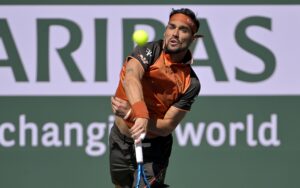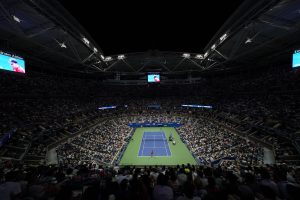In the wake of Naomi Osaka’s surprising split with her coach, Sascha Bajin, which was announced earlier this week, Martin Keady, our resident tennis historian, looks back at five previous player-coach splits for ATP and WTA players that really did not work out, either for the player or the coach, or on occasion both!
Naomi Osaka is clearly not a subscriber to the “if it ain’t broke, don’t fix it!” principle. Having won two Grand Slam titles in a row, and just as she appeared to be on the point of becoming the dominant Women’s World No.1, she announced earlier this week that she is splitting from her coach, Sascha Bajin.
Neither Osaka nor Bajin gave any reason publicly for the termination of their incredibly successful relationship. In the wake of winning the Australian Open last month, Osaka had talked about wanting to gear up for the next two Majors, on the clay of Paris and the grass of Wimbledon, so it may have been that she wanted to recruit a specialist clay-court or grass-court coach to prepare her for the challenges ahead. However, if that was the case, she would surely have been wiser in adding such a specialist to her team, rather than replacing Bajin with them.
Whatever the reason for their split, both Osaka and Bajin will surely hope that it proves to be more successful than these previous player-coach splits.
Here are five terrible player-coach splits.
- ANDY MURRAY AND IVAN LENDL
The seemingly inevitable end of Andy Murray’s playing career, due to injury problems, will leave unanswered one intriguing question about the great Scot: could he ever have won a Major without having Ivan Lendl as his coach? Given that Murray only ever won Majors while Lendl was in his player’s box, the answer is likely to have been “no”.
Having lost his first four Major Singles finals under a succession of different coaches, Murray deliberately recruited Lendl as his full-time coach for the start of the 2012 season. Indeed, Murray said that one of the main reasons that he had hired Lendl, who had never previously coached anyone, was that the Czech was the only other man to have lost his first four Major Finals and so could directly relate to his situation.
The result was tennis history. Perhaps because he would not have dared to cross the famously intimidating Lendl, the previously petulant Murray immediately appeared to calm down on court and soon afterwards won his first two Majors (the 2012 US Open and Wimbledon in 2013). Lendl then stopped being Murray’s coach for a time, reportedly so that he could spend more time with his ailing elderly mother, before returning triumphantly in 2016, just before Wimbledon that year, which Murray duly won to complete his hat-trick of Majors.
It was all the more surprising, therefore, that soon after that second Wimbledon triumph Murray and Lendl again stopped working together, supposedly because Lendl did not want to work on the tour full-time, although he has subsequently committed to doing so with Sacha Zverev. Murray has not won another Major since 2016 and now that his career is approaching its end it appears certain that he never will.
- NOVAK DJOKOVIC AND MARIÁN VAJDA
It is arguable that Novak Djokovic and Marián Vajda never formally “split” from each other during Djokovic’s long period in the tennis wilderness, between his completion of the career Grand Slam at Paris in 2016 and his comeback Wimbledon win in 2018. However, to use romantic parlance they at least took a “break” from each other while Djokovic experimented with a succession of so-called “super-coaches”, from Boris Becker to Andre Agassi, all of whom may have won more Majors than Vajda ever did but none of whom could replicate his prowess as a coach. At times, Vajda was effectively demoted from his position as Djokovic’s “head coach”, while Becker, Agassi et al took up prime position in Djokovic’s player’s box.
Arguably, it was only when Djokovic finally ditched his “super coaches” (and all the other would-be gurus and mentors he had become entangled with, on and off the court) and went back to his plain old superb coach, Vajda, that he finally rediscovered his “nojo” and became, once more, the dominant player on the men’s circuit. Vajda was rewarded by being named as the “Coach of the Year” at the end of 2018, but as many tennis writers suggested at the time, “Coach of the Decade” would have been a more appropriate accolade.
- JOHANNA KONTA AND WIM FISSETTE
Sometimes, as with Murray-Lendl and Djokovic-Vajda, player-coach splits can be resolved, at least temporarily, to the satisfaction of both parties. On other occasions, however, the split turns out to be permanent and invariably one party ends up being the bigger loser. In the case of Johanna Konta and Wim Fissette, there is absolutely no doubt that it was the Belgian coach who ended up prospering the most after the end of their relationship.
Like many players (both male and female), Konta has had a number of coaches throughout her career; rare is the player-coach relationship that lasts forever. However, arguably the single biggest influence on her career was not a tennis coach at all, but the mental or “mind” coach, Juan Coto. Konta largely attributed her stunning upturn in form in 2016 and 2017, which culminated in her historic run to the 2017 Wimbledon semi-finals (when she became the first British woman in 40 years to reach the last four at SW19), to Coto’s methods. Therefore, it was all the more devastating for her when Coto tragically and apparently inexplicably took his own life at the end of 2016.
Konta’s actual tennis coach during her historic 2017 Wimbledon run was the illustrious Belgian coach, Wim Fissette, who had previously worked with a succession of Women’s World No.1s, including Victoria Azarenka and Simona Halep. However, after Konta’s poor end to the 2017 season, which was almost certainly due to the inevitable comedown after the high of Wimbledon, she and Fissette parted company at the end of that year.
Konta has struggled to return to her 2017 peak, arguably only coming close since in her remarkable performance last weekend for Great Britain in the Fed Cup, when she won three three-set matches in three days despite being close to physical collapse. By contrast, Fissette has flourished. A year after going so close to reaching the Wimbledon Final with Konta, he won Wimbledon as a coach, when his new charge, Angelique Kerber, was crowned the 2018 Ladies’ Singles Champion.
TIED 1ST: DOKIC-DOKIC AND TOMIC-TOMIC
The already difficult nature of the player-coach relationship, in which the coach is often the one person who can “speak the truth” to the otherwise all-powerful player (as appears to have been the case with both the Murray-Lendl and Djokovic-Vajda partnerships), is made even more difficult when the coach in question is the player’s parent. There are numerous examples of how difficulties in the player-coach relationship can ultimately sour the even more important child-parent relationship. However, perhaps the two outstanding ones (“outstanding” in the sense of being absolutely awful) are two Australian pairings: Jelena Dokic and her father, Damir; and Bernard Tomic and his father, John.
Both Jelena Dokic and Bernard Tomic achieved global fame early on in their career by achieving stunning performances at Wimbledon: Dokic beat the then World No.1 Martina Hingis in 1999, when she was a 16-year-old qualifier; and Tomic reached the semi-finals in 2011, when he was only 18. Unfortunately, however, neither Dokic nor Tomic really built on those early breakthroughs: Dokic never reached another Grand Slam semi-final before she finally retired in 2013; and Tomic, too, has never reached another Grand Slam semi-final and currently languishes at No. 87 in the world, which is an almost ludicrously low ranking for a player of his undoubted talent.
Both Dokic and Tomic were coached to their early successes by their fathers, but both have also subsequently attributed the relative failure of the rest of their careers to their fathers. In her biography, written after her retirement, Dokic accused her father, Damir, of subjecting her to horrendous mental and even physical abuse, especially when he persuaded her to represent Serbia (his homeland) rather than Australia. And although John Tomic is not alleged to have abused his son, he certainly abused his son’s hitting partner, Thomas Drouet, when he was found guilty of headbutting him in 2013.
Damir Dokic and John Tomic are probably the most extreme examples of the famously “pushy” tennis parent. When such parents are also their child’s coach, the player-coach relationship, and indeed the parent-child relationship, is almost certainly doomed to failure. So, as Naomi Osaka contemplates her next coaching appointment, she can at least be grateful that she only has to find a new coach, and not a new parent, too.
Main Photo:





